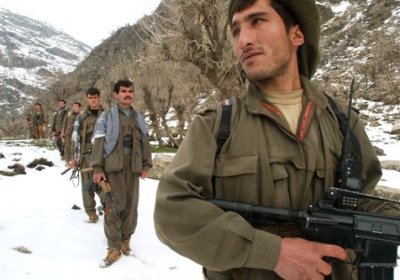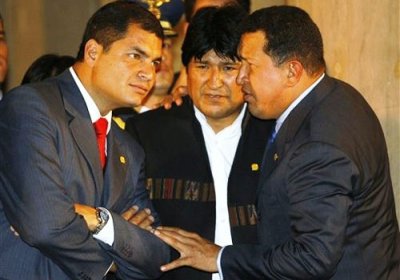Thirty one Rohingya refugees in a detention centre in Darwin ended their 12-day hunger strike on June 25. They were protesting against the Australian government’s delay in processing their asylum claims, an average of nine months after their boats’ interception.
843
In her opening remarks as Australia’s new prime minister, Julia Gillard said she believed climate change was real and was caused by human activity. What she left unsaid was that she doesn’t believe in doing much to stop it.
Former PM Kevin Rudd’s rapid nosedive in the opinion polls coincided with Labor’s April decision to dump its proposed emissions trading scheme until 2013.
The scheme itself was radically flawed, but many people still associated it with action on climate change. More than with any other issue, Labor was punished for its perceived backflip on climate.
On June 1, the Kurdish Workers Party (PKK) announced an end to its 13-month unilateral ceasefire. Since 1984, the PKK has waged an armed struggle against the Turkish state for Kurdish self-determination.
A day earlier, imprisoned PKK leader Abdullah Ocalan announced that he was withdrawing from negotiations. He cited a disconnect between the Turkish government’s promised reforms and continued violent repression of Turkey’s Kurdish population.
The Bolivarian Alliance for the Peoples of Our America (ALBA) released a statement on June 28 reaffirming its commitment to the Honduran people’s struggle for a return to democracy one year after the coup that overthrew president Manuel Zelaya.
ALBA is an anti-imperialist alliance founded in 2004 by Cuba and Venezuela. Its members include Bolivia, Ecuador, Nicaragua, Dominica, Saint Vincent and the Grenadines, and Antigua and Barbuda.
Under Zelaya, Honduras joined ALBA, which suspended Honduras’s membership after the coup. The regime has since withdrawn from ALBA.
The detention of about 150 asylum seekers in a disused mining camp at Leonora, near Kalgoorlie in remote Western Australia, is a return to the dark days of previous Coalition prime minister John Howard.
Under Howard, asylum seekers were detained at a disused defence department shooting range at Woomera in South Australia. Both cases involve refugees being detained at remote prison camps and only allowed out accompanied by detention centre staff.
25 intrepid activists left on July 2 for Alice Springs as part of a Justice Ride to show solidarity with Aboriginal people fighting against the NT intervention. They will take part in the Defending Indigenous Rights: Land Law Culture convergence in Alice Springs from July 6 to 9.
The Queensland Crime and Misconduct Commission (CMC) recently released a report highly critical of the police investigation into the case of Palm Island Aboriginal man Mulrunji Doomadgee, who died in police custody in November 2004. The CMC gave police commissioner Bob Atkinson 14 days to take disciplinary action against six officers involved.
Atkinson was due to make his decision by July 2, but an injunction filed on behalf of the officers extended the deadline until July 6
Just after becoming prime minister, Julia Gillard told media on June 24 she could understand “the anxiety and indeed fears that Australians have when they see [refugee] boats”. She did not cite evidence for this claim. She said that, as PM, she would explain to the Australian people “what we are doing to manage our borders and what we are doing to manage asylum seeker flows”.
The number of “High Net Worth Individuals” (HNWIs) in Australia — those with more than US$1 million in investable assets, excluding the family home — soared to 173,600 last year. This, according to the latest World Wealth Report, was an increase of 34.4% on the year before.
The June 30 Sunshine Coast Daily said: “What's more impressive is Australia's ranking in the global population of HNWIs. Out of 71 countries, Australia has the 10th biggest population of HNWIs in the world, in front of Brazil and just behind that millionaire's paradise of Switzerland.”
A Short Border Handbook
By Gazmend Kapllani
Portobello Books 2009
159 pages
Review by Alex Miller
This book, which the author describes as “part autobiography, part fiction”, is hard to assess. Each chapter is divided into two parts. The first part tells the story of a man (presumably Kapllani himself) who crosses into Greece from Albania when the border between those two countries opened in 1991. The second part consists of “philosophical” ruminations on issues raised by the story of the first part.
South Australian independent Bob Such announced on June 28 he would introduce a private member's bill into the state parliament that would, in effect, ban the wearing of the burqa or the niqab in banks and government buildings.
Such claimed his bill would not be discriminatory and would target any face covering where security might be a concern. However, all his public statements have specifically raised the burqa and its possible use in criminal activity.
Multicultural affairs minister Grace Portolesi said SA police have said they have no such concerns about the burqa.
National Tertiary Education Union (NTEU) members at the University of New South Wales (UNSW) began industrial action on June 30 to pressure management to reach agreement with the union on a range of claims. They want reinstatement of job security protections for contract research staff; improved conditions for casual and fixed-term staff; Indigenous employment targets and an increase in paid parental leave from 26 to 36 weeks.
- Previous page
- Page 3
- Next page









